
The United States Air Force (USAF) is the air service branch of the United States Armed Forces, and is one of the eight uniformed services of the United States. Originally created on 1 August 1907, as a part of the United States Army Signal Corps, the USAF was established as a separate branch of the United States Armed Forces in 1947 with the enactment of the National Security Act of 1947. It is the second youngest branch of the United States Armed Forces and the fourth in order of precedence. The United States Air Force articulates its core missions as air supremacy, global integrated intelligence, surveillance and reconnaissance, rapid global mobility, global strike, and command and control.

The U.S. Army Medical Command (MEDCOM) is a direct reporting unit of the U.S. Army that formerly provided command and control of the Army's fixed-facility medical, dental, and veterinary treatment facilities, providing preventive care, medical research and development and training institutions. On 1 October 2019, operational and administrative control of all military medical facilities transitioned to the Defense Health Agency.

The Air Force Reserve Command (AFRC) is a major command (MAJCOM) of the United States Air Force, with its headquarters at Robins Air Force Base, Georgia. It is the federal Air Reserve Component (ARC) of the U.S. Air Force, consisting of commissioned officers and enlisted airmen. Together, the Air Force Reserve and the Air National Guard constitute the Air Force element of the reserve components of the United States Armed Forces. AFRC also plays an integral role in the day-to-day Air Force mission and is not strictly a force held in reserve for possible war or contingency operations. AFRC also supports the United States Space Force through the 310th Space Wing, pending the creation of a space reserve component.
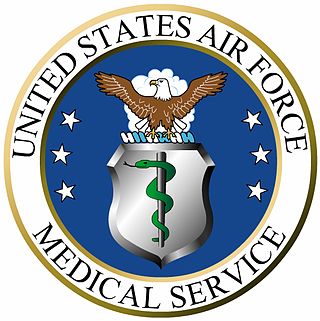
The United States Air Force Medical Service (AFMS) consists of the five distinct medical corps of the Air Force and enlisted medical technicians. The AFMS was created in 1949 after the newly independent Air Force's first Surgeon General, Maj. General Malcolm C. Grow (1887–1960), convinced the United States Army and President Harry S. Truman that the Air Force needed its own medical service.
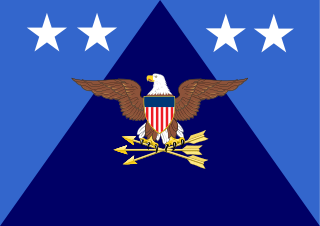
The under secretary of defense for personnel and readiness, or USD (P&R) is a high-ranking civilian position in the Office of the Secretary of Defense (OSD) within the United States Department of Defense responsible for advising the secretary and deputy secretary of defense on recruitment, career development, pay and benefits, and oversight of the state of military readiness. The under secretary is appointed from civilian life by the president and confirmed by the Senate to serve at the pleasure of the President.
The structure of the United States Air Force refers to the unit designators and organizational hierarchy of the United States Air Force, which starts at the most senior commands.

The 59th Medical Wing (MDW) is the U.S. Air Force's largest medical wing and is the Air Force functional medical command for Joint Base San Antonio (JBSA). It comprises seven medical groups across San Antonio. Three are located at the Wilford Hall Ambulatory Surgical Center (WHASC); the 959th Medical Group is located at San Antonio Military Medical Center (SAMMC), JBSA-Fort Sam Houston; the 59th Training Group - the wing's newest group, activated on 4 January 2016, is also located at JBSA-Fort Sam Houston. The 359th and 559th Medical Groups are located at and support the missions of JBSA-Randolph and JBSA-Lackland, respectively.

The 65th Air Base Group is a group of the United States Air Force based at Lajes Field, Azores, Portugal.
The Assistant Secretary of Defense for Health Affairs (ASD(HA)) is chartered under United States Department of Defense Directive (DoDD) 5136.1 in 1994. This DoDD states that the ASD(HA) is the principal advisor to the U.S. Secretary of Defense on all "DoD health policies, programs and activities." In addition to exercising oversight of all DoD health resources, ASD(HA) serves as director of the Tricare Management Activity.
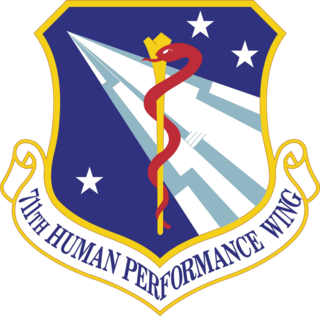
The 711th Human Performance Wing is a wing of the United States Air Force based at Wright-Patterson Air Force Base near Dayton, Ohio.

Air Force Global Strike Command (AFGSC) is a Major Command (MAJCOM) of the United States Air Force, headquartered at Barksdale Air Force Base, Louisiana. AFGSC provides combat-ready forces to conduct strategic nuclear deterrence and global strike operations in support of combatant commanders. Air Force Global Strike Command is the Air Force's service component to the United States Strategic Command (USSTRATCOM).

The Department of the Air Force Inspection Agency (DAFIA) operates as a U.S. Air Force Field Operating Agency under the direction of the Air Force Inspector General. It provides independent assessments of acquisition, nuclear surety, operations, logistics, support, and healthcare to Air Force senior leadership. Additionally, the agency identifies deficiencies and recommends improvements for accomplishing peacetime and wartime missions. It also evaluates Air Force activities, personnel, and policies, and provides legal and compliance oversight of all Air Force-level Field Operating Agencies and Direct Reporting Units.

The Air Force Medical Support Agency (AFMSA) provides comprehensive consultative support and policy development for the Air Force Surgeon General in medical force management. It also provides operational support for ground and air expeditionary medical capabilities used in global, homeland security and force health protection as well as all aspects of medical and dental services, aerospace medicine operations, and medical support functions. Additionally, the AFMSA executes policy and programs for modernizing medical capabilities to address critical challenges for operational and peacetime health care and for the joint warfighter through technological solutions. The agency ensures strategic initiatives are fully supported through the planning, programming, budget, execution system and the execution of the budget to fully support global medical capability and national security strategies.

The Defense Health Agency (DHA) is a joint, integrated combat support agency that enables the U.S. Army, U.S. Navy, U.S. Air Force, and U.S. Space Force medical services to provide a medically ready force and ready medical force to Combatant Commands in both peacetime and wartime. The DHA is in charge of integrating clinical and business operations across the MHS and facilitates the delivery of integrated and reasonably priced health care to MHS clients.

The Air Force Installation and Mission Support Center (AFIMSC), headquartered at Joint Base San Antonio-Lackland (JBSA-Lackland), Texas, is one of six centers aligned under Air Force Materiel Command for the United States Air Force. AFIMSC serves as the single intermediate-level headquarters responsible for providing installation and mission support to 77 Air Force installations, nine major commands and two direct reporting units with an annual budget of approximately $10 billion. The center comprises four directorates, 10 detachments, and four primary subordinate units, or PSUs. The AFIMSC cross-functional team provides globally integrated management, resourcing and combat support operations for Airmen and family services, base communications, chaplain, civil engineering, contracting, logistics readiness, public affairs, security forces and financial management programs.

The Inspector General of the Department of the Air Force is responsible for conducting investigations and inspections as directed by the Secretary of the Air Force, Chief of Staff of the United States Air Force, and Chief of Space Operations. The position was originally established after World War II as The Air Inspector, which was carried over from the United States Army Air Forces. The current mission of the Inspector General is prescribed by Title 10 and Title 32 of the United States Code to develop United States Air Force (USAF) and United States Space Force (USSF) policy to assess readiness, discipline and efficiency with a vision to help shape senior leader decisions affecting the readiness of the USAF and USSF to strengthen the nation's defense.
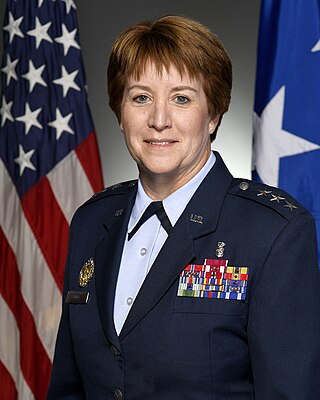
Dorothy A. Hogg is a retired lieutenant general of the United States Air Force who last served as the twenty-third Surgeon General of the United States Air Force and the first Surgeon General of the United States Space Force. Hogg serves as functional manager of the U.S. Air Force Medical Service. In this capacity, she advises the Secretary of the Air Force and Air Force Chief of Staff, as well as the Assistant Secretary of Defense for Health Affairs on matters pertaining to the medical aspects of the air expeditionary force and the health of Airmen.
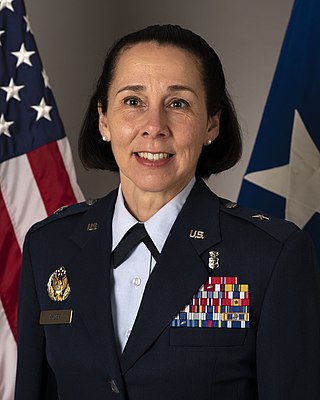
Jeannine M. Ryder is a U.S. Air Force brigadier general and the Chief of the Air Force Nurse Corps. Ryder also serves as the Commander, 59th Medical Wing, Joint Base San Antonio-Lackland, and director, San Antonio Market, Defense Health Agency. Ryder, an Air Force nurse, is the first female commander of two Air Force wings. Ryder was also the first female commander at Keesler Medical Center, the first female commander of the 711th Human Performance Wing in Air Force Research Laboratory, and the first female commander of the 59th Medical Wing.
















